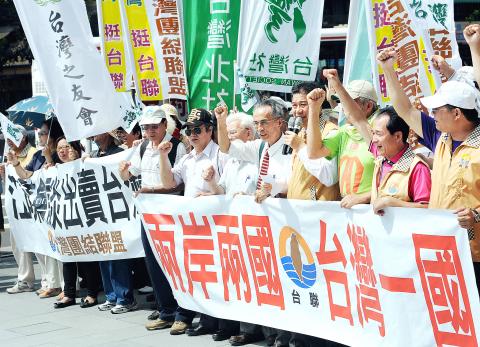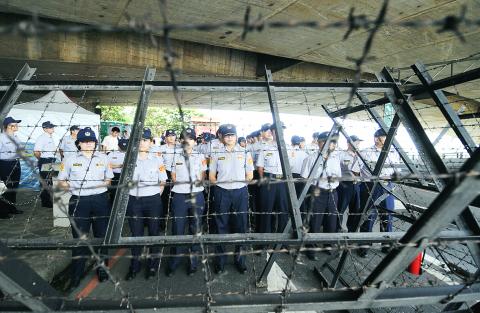Chinese envoy Chen Yunlin (陳雲林) arrived in Taipei yesterday to begin negotiations on a cross-strait investment protection agreement, amid protests by pro-independence activists concerned that the pact could damage Taiwanese sovereignty.
The chairman of the Association for Relations Across the Taiwan Straits (ARATS) is on a three-day visit to hold talks with his Taiwanese counterpart, Straits Exchange Foundation (SEF) Chairman Chiang Pin-kung (江丙坤). The two are expected to sign the investment protection pact today at the Grand Hotel.
Hundreds of police have been deployed around the Grand Hotel and its vicinity, and barricades have been put up in front of all entrances to the hotel to keep out protesters. The control area was expanded to 10km2, with police cars patrolling roads leading up to the hotel, including Zhongshan N Road, Beian Road and Xinsheng N Road.

Photo: Fang Pin-chao, Taipei Times
The Grand Hotel also limited its shuttle bus service at the MRT Yuan-shan Station to hotel guests who have already made reservations, cross-strait negotiation staff and media personnel covering Chen’s three-day visit. Hotel staff were sent to screen passengers at the bus stop.
A hotel employee, who wished not to be named, said the hotel had adopted temporary transportation controls in coordination with the police’s security measures.
“Some protesters had sneaked into the hotel and pretended they were hotel guests, and so the police asked the hotel to make sure that only hotel guests and related personnel enter the hotel this time,” she said.

Photo: Lo Pei-der, Taipei Times
A small group of independence advocates clashed with police yesterday morning when they tried to enter the hotel. They were later dispersed by the police.
Chen arrived at the hotel at about 1pm, an hour behind schedule due to a flight delay. The organizers canceled the welcome ceremony at the hotel, as Chen and Chiang headed to Taipei Zoo and the Maokong Gondola for an afternoon tour.
Meeting with the press before Chen’s arrival, Chiang said the investment protection agreement would establish a platform for investors from both sides of the Taiwan Strait to solve investment disputes in a systematic way and make such investments more transparent.
The pact will set up a mechanism to solve disputes involving G2G (government-to-government), P2P (private-to-private) and P2G (private-to-government), and help protect the rights of Taiwanese businesses in China.
The government has also promised that the agreement would not pave the way for the entry of more Chinese investment and capital.
Chen later issued a statement saying that both the investment protection agreement and the planned customs cooperation agreement were crucial to follow-up negotiations on the cross-strait Economic Cooperation Framework Agreement (ECFA).
At the Chiang-Chen meeting, the two envoys will determine the agenda in the next round of cross-strait talks. The pair said they would focus on negotiations on trade in goods and services, as well as setting up a dispute-solving mechanism under the ECFA.
“The two sides are still negotiating issues including trade in services and trade in goods, and we should complete the negotiations on the trade in service, which is less complicated than issues involving trade in goods,” Chiang said.

CHAOS: Iranians took to the streets playing celebratory music after reports of Khamenei’s death on Saturday, while mourners also gathered in Tehran yesterday Iranian Supreme Leader Ayatollah Ali Khamenei was killed in a major attack on Iran launched by Israel and the US, throwing the future of the Islamic republic into doubt and raising the risk of regional instability. Iranian state television and the state-run IRNA news agency announced the 86-year-old’s death early yesterday. US President Donald Trump said it gave Iranians their “greatest chance” to “take back” their country. The announcements came after a joint US and Israeli aerial bombardment that targeted Iranian military and governmental sites. Trump said the “heavy and pinpoint bombing” would continue through the week or as long

TRUST: The KMT said it respected the US’ timing and considerations, and hoped it would continue to honor its commitments to helping Taiwan bolster its defenses and deterrence US President Donald Trump is delaying a multibillion-dollar arms sale to Taiwan to ensure his visit to Beijing is successful, a New York Times report said. The weapons sales package has stalled in the US Department of State, the report said, citing US officials it did not identify. The White House has told agencies not to push forward ahead of Trump’s meeting with Chinese President Xi Jinping (習近平), it said. The two last month held a phone call to discuss trade and geopolitical flashpoints ahead of the summit. Xi raised the Taiwan issue and urged the US to handle arms sales to

State-run CPC Corp, Taiwan (CPC, 台灣中油) yesterday said that it had confirmed on Saturday night with its liquefied natural gas (LNG) and crude oil suppliers that shipments are proceeding as scheduled and that domestic supplies remain unaffected. The CPC yesterday announced the gasoline and diesel prices will rise by NT$0.2 and NT$0.4 per liter, respectively, starting Monday, citing Middle East tensions and blizzards in the eastern United States. CPC also iterated it has been reducing the proportion of crude oil imports from the Middle East and diversifying its supply sources in the past few years in response to geopolitical risks, expanding

An Emirates flight from Dubai arrived at Taiwan Taoyuan International Airport yesterday afternoon, the first service of the airline since the US and Israel launched strikes against Iran on Saturday. Flight EK366 took off from the United Arab Emirates (UAE) at 3:51am yesterday and landed at 4:02pm before taxiing to the airport’s D6 gate at Terminal 2 at 4:08pm, data from the airport and FlightAware, a global flight tracking site, showed. Of the 501 passengers on the flight, 275 were Taiwanese, including 96 group tour travelers, the data showed. Tourism Administration Deputy Director-General Huang He-ting (黃荷婷) greeted Taiwanese passengers at the airport and